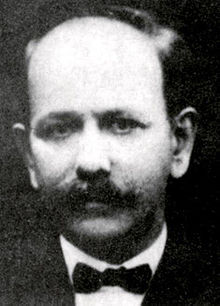Ali Akbar Dehchoda
Ali Akbar Dehchoda ( Persian علیاکبر دهخدا Ali-Akbar Dehchodā , DMG ʿAlī Akbar Dehḫodā , * 1879 in Tehran ; † March 9, 1956 in Tehran) was an Iranian linguist and author of the " Dictionary of Dehchoda " (Loghat-nāme-ye Dehchodā) - the most extensive dictionary of the Persian language.
Life
Dehchoda was born in Tehran in 1879. He lost his father at the age of 9. Dehchoda first studied theology, Islamic history, Arabic and Persian literature with Sheikh Gholamhossein Boroudscherdi. From 1899 he attended the newly opened school for political science in Tehran. Dehchoda had degrees in Persian Literature , Arabic and French and a degree in Political Science .
Dehchoda began his professional career in 1903 as the secretary of an Iranian diplomat in Austria. After his return to Iran in 1905, he was a staunch democrat who, without hesitation, participated in the Constitutional Revolution and advocated a secular state. Together with Mirzā Jahāngir Chān and Ghasem Khan , Dehchoda published the newspaper Sur-e Esrāfil for two years . He wrote the comments on the first page and criticized political despotism , hypocrisy and obscurantism . He did not shy away from accusing the rich of not paying their taxes, and turned against the notion widespread in Iran that one's own misfortune is primarily the fault of “foreign powers” and less of one's own inability. In political satires he attacked the view of the Qajar court that the economic laws of an economy, to increase the prosperity of a people through the wise use of labor, capital and land, could not apply to Iran. It is generally accepted that "money falls from the sky," wrote Dehchoda. The newspaper had a resounding success with a circulation of 24,000 copies.
When Mohammed Ali Shah dissolved parliament in 1908 , Dehchoda fled to the British embassy and later to Paris and Istanbul, where he continued to publish articles. When Mohammed Ali Shah had to leave Iran for good in 1911 and the constitutional government took over again, Dehchodā returned to his country and became a member of the newly elected parliament.
During the First World War, Dehchoda left Tehran and moved to northern Iran. All he had with him was a copy of the Larousse French dictionary . So he decided to find a Persian equivalent for each entry. Work on the Logatnameh dictionary had begun. It should be the passion of his life. At the end there was an encyclopedia that had an entry on every topic, every person, every city and every village or river in Iran.
In 1924 Dehchoda became dean of the Tehran School of Political Science and later of the Faculty of Law at the University of Tehran . In parallel to his scientific activity, Dehchoda worked tirelessly on his encyclopedia.
When Mossadegh became Prime Minister in 1951, Dehchoda was initially one of his supporters. During this time, parliament passed a law to publish the Dehchodas encyclopedia at the state expense. The government then acquired the rights to the encyclopedia. After the fall of Mossadegh, Dehchoda bequeathed Logatnameh "to the Iranian people" in a letter to parliament in 1954.
Ali Akbar Dehchodā died on March 9, 1956. He is buried in the Ebn-e Babooyeh cemetery in the city of Rey near Tehran.
Publications
Dehchoda translated Montesquieu's From the Spirit of Laws ( De L'esprit des Loix ) into Persian. He also published the four-volume French-Persian Dictionary of Proverbs Amsal o Hekam and several other books. His masterpiece, however, remains the most extensive dictionary of the Persian language to date, the 15-volume Loghat-nāme-ye Dehchodā (Dictionary of Dehchodā). Dr. Mohammad Moin completed the unfinished volumes when Dehchoda asked him to do so. It took 45 years to complete the dictionary.
See also
literature
- A.-A. Sa'īdī Sirjāni: DEHḴODĀ, MĪRZĀ ʿALĪ-AKBAR QAZVĪNĪ . In: Ehsan Yarshater (Ed.): Encyclopædia Iranica (English, including references)
- Abbas Milani: Eminent Persians. Syracus University Press, 2008, pp. 909-914.
- Ğolām-Hosayn Yūsofī: ČARAND PARAND . In: Ehsan Yarshater (Ed.): Encyclopædia Iranica (English, including references)
Web links
- Ali Akbar Dehchodā on the Iranchamber
- Dehchoda on Jazirehdanesh .com (Island of Science) (Persian)
- Syma Sayyah, Dehkhoda Institute: A Hidden Treasure National , Payvand 19 March, 2007 (english)
Individual evidence
- ↑ Historical Events ( Memento of October 30, 2004 in the Internet Archive )
- ↑ Photograph of Dehkhoda's grave: (1)
| personal data | |
|---|---|
| SURNAME | Dehchoda, Ali Akbar |
| ALTERNATIVE NAMES | Dehkhoda, Ali Akbar |
| BRIEF DESCRIPTION | Persian linguist and man of letters |
| DATE OF BIRTH | 1879 |
| PLACE OF BIRTH | Tehran |
| DATE OF DEATH | March 9, 1956 |
| Place of death | Tehran |
